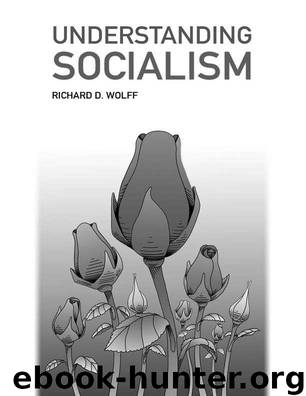Understanding Socialism by Richard D. Wolff

Author:Richard D. Wolff [Wolff, Richard D.]
Language: eng
Format: epub
ISBN: 9780578232676
Publisher: Democracy at Work
Published: 2020-04-09T05:00:00+00:00
The People's Republic of China (PRC)
Alliances between the USSR and the eventual Communist Party leaders of the PRC reach back into the 1920s, continued until 1960, rose and fell thereafter, and have recently resumed. There have been strong similarities and solidarities but also deep differences. China entered the 20th century extremely poor, with extreme economic, political, and cultural inequality. While China had resisted Western colonialism sufficiently to remain united, it had suffered deeply humiliating demands, including the establishment of certain Western colonial enclaves (such as Hong Kong) on China's territory. Colonialism's military superiority enforced those demands. The humiliation was and remains informed by a long history that included centuries of a far more advanced Chinese civilization than had then been achieved in Europe. A deep sense of having been overtaken and surpassed by others settled into China’s self-consciousness. That continues to fuel a drive for China in turn to overtake and surpass. In a profound sense, socialism (China’s version of Soviet-style state capitalism) is seen in China as the proven way to do that.
At the very beginning of the 20th century, the Boxer Rebellion and then the formation of the new republic, with Sun Yat-sen as president, inaugurated a key break from China’s past. Feudalisms of various sorts and individual (family) peasant self-employment had been the dominant organizations of workplaces. But a transition to capitalist organizations (employers/employees) was underway. It was increasingly encouraged as a way to catch up with the West and so enable that mix of anti-colonialism and modernization that Chinese leaders (ideological as well as political) championed. As elsewhere, early capitalism produced extreme exploitation on the job and extremely poor living conditions off the job. For just that reason, an early influence of the then-new USSR was to encourage and support anti-capitalist organization among China’s new industrial proletariat.
Small early victories led to large defeats for these organizations. Their leaders, especially Mao Zedong, took followers into a kind of distant, internal rural exile to escape slaughter by a military then closely allied to the emerging Chinese capitalism. There, they solidified their organization, undertook an intensive self-education in socialism and especially its Marxian formulations, and studied the history of the USSR. On the basis of those activities they reorganized the local peasant economy in ways that celebrated peasants’ collective self-management of farming. They also organized a peasant army.
When Japan invaded China and took over Manchuria in 1931, Chinese society mobilized in self-defense. In the war that lasted basically until 1945, the civil conflict between the dominant capitalist forces (around General Chiang Kai-shek) and the Communist Party resistance (around Mao Zedong and his Eighth Route Army) was suspended. A combined counteroffensive against the Japanese ended with victory and Japanese expulsion in 1945. Immediately a civil war erupted. It ended in 1949 with the complete victory of the Chinese Communist Party. The capitalist forces and army went into exile on the small offshore island of Taiwan. It broke away from the Chinese mainland and is now effectively an independent country with a capitalist economic system.
Download
This site does not store any files on its server. We only index and link to content provided by other sites. Please contact the content providers to delete copyright contents if any and email us, we'll remove relevant links or contents immediately.
| Anarchism | Communism & Socialism |
| Conservatism & Liberalism | Democracy |
| Fascism | Libertarianism |
| Nationalism | Radicalism |
| Utopian |
The Secret History by Donna Tartt(19083)
The Social Justice Warrior Handbook by Lisa De Pasquale(12190)
Thirteen Reasons Why by Jay Asher(8907)
This Is How You Lose Her by Junot Diaz(6885)
Weapons of Math Destruction by Cathy O'Neil(6279)
Zero to One by Peter Thiel(5798)
Beartown by Fredrik Backman(5751)
The Myth of the Strong Leader by Archie Brown(5507)
The Fire Next Time by James Baldwin(5441)
How Democracies Die by Steven Levitsky & Daniel Ziblatt(5218)
Promise Me, Dad by Joe Biden(5153)
Stone's Rules by Roger Stone(5087)
A Higher Loyalty: Truth, Lies, and Leadership by James Comey(4959)
100 Deadly Skills by Clint Emerson(4924)
Rise and Kill First by Ronen Bergman(4788)
Secrecy World by Jake Bernstein(4751)
The David Icke Guide to the Global Conspiracy (and how to end it) by David Icke(4717)
The Farm by Tom Rob Smith(4506)
The Doomsday Machine by Daniel Ellsberg(4489)
